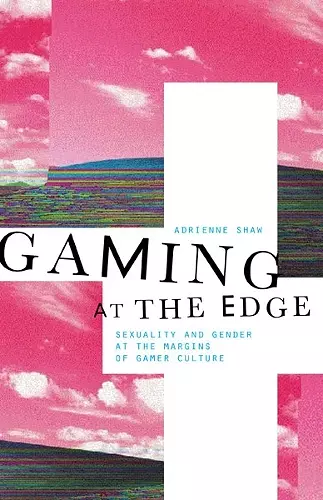Gaming at the Edge
Sexuality and Gender at the Margins of Gamer Culture
Format:Hardback
Publisher:University of Minnesota Press
Published:1st Jan '15
Currently unavailable, and unfortunately no date known when it will be back
This hardback is available in another edition too:
- Paperback£21.99(9780816693160)

Video games have long been seen as the exclusive territory of young, heterosexual white males. In a media landscape dominated by such gamers, players who do not fit this mold, including women, people of color, and LGBT people, are often brutalized in forums and in public channels in online play. Discussion of representation of such groups in games has frequently been limited and cursory. In contrast, Gaming at the Edge builds on feminist, queer, and postcolonial theories of identity and draws on qualitative audience research methods to make sense of how representation comes to matter.
In Gaming at the Edge, Adrienne Shaw argues that video game players experience race, gender, and sexuality concurrently. She asks: How do players identify with characters? How do they separate identification and interactivity? What is the role of fantasy in representation? What is the importance of understanding market logic? In addressing these questions Shaw reveals how representation comes to matter to participants and offers a perceptive consideration of the high stakes in politics of representation debates.
Putting forth a framework for talking about representation, difference, and diversity in an era in which user-generated content, individualized media consumption, and the blurring of producer/consumer roles has lessened the utility of traditional models of media representation analysis, Shaw finds new insight on the edge of media consumption with the invisible, marginalized gamers who are surprising in both their numbers and their influence in mainstream gamer culture.
"Gaming at the Edge offers a fantastic intervention into not only gaming, but media studies more broadly. Adrienne Shaw astutely argues that our approach to understanding representation in games has been far too simplistic and, through her careful fieldwork, offers a rich framework for future studies. This is an important book for not only those interested in gaming, but anyone thinking about the complexities of representation and media."—T.L. Taylor, MIT
"Gaming at the Edge is the book that video game studies needs right now. Adrienne Shaw explodes the notion that video game's gender and race problems will be solved by greater representation of these groups. "—Lisa Nakamura, author of Race After the Internet
"Straight-forward, thoroughly argued and well-illustrated."—Digital Culture and Education
"In Gaming at the Edge, Shaw offers an astute critique of come of the common wisdom about video games, their players, and representation."—Women’s Review of Books
"This is an excellent, well-researched, and well-argued text that would be welcomed by any researcher or designer interested in more fully understanding the complexities of how identity relates to the world of games and play."—American Journal of Play
"Scholars of gender, game studies, or media studies more generally would find Gaming at the Edge to be a critical and thought-provoking analysis of race, gender, and sexuality in video games."—Contemporary Sociology
"Shaw's book is valuable for the study of representation across media and should be required reading on the politics, possibilities, and problems of media representation."—Communication, Culture & Critique
"Shaw’s powerful words evoke utopian visions of inclusivity and intersubjectivity that are sure to serve as productive forces of inspiration in a number of diverse disciplines."—The Geek Anthropologist
"Shaw’s Gaming at the Edge is both accessible and academic, and takes a much-needed critical, sociopolitical stance on the importance of diversity and inclusion in video games."—The Learned Fangirl
"Shaw is extremely skilled at conveying complex and important concepts in an understandable and engrossing way."—International Journal of Communication
"Offers an ethnographic study that explores the ways members of marginalized groups engage with video games, how the ability to identify with the characters represented in games shapes this engagement, and argues that ongoing conversations about diversity in games should be reframed to account for the intersectional nature of identity."—First Person Scholar
- Winner of Gaming at the Edge 2015
ISBN: 9780816693153
Dimensions: 216mm x 140mm x 38mm
Weight: unknown
304 pages